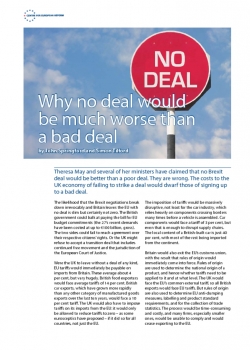
Why no deal would be much worse than a bad deal
Theresa May and several of her ministers have claimed that no Brexit deal would be better than a poor deal. They are wrong. The costs to the UK economy of failing to strike a deal would dwarf those of signing up to a bad deal.
The likelihood that the Brexit negotiations break down irrevocably and Britain leaves the EU with no deal is slim but certainly not zero. The British government could balk at paying the bill for EU budget commitments (the 27’s recent demands have been costed at up to €100 billion, gross). The two sides could fail to reach agreement over their respective citizens’ rights. Or the UK might refuse to accept a transition deal that includes continued free movement and the jurisdiction of the European Court of Justice.
Were the UK to leave without a deal of any kind, EU tariffs would immediately be payable on imports from Britain. These average about 4 per cent, but vary hugely. British food exporters would face average tariffs of 14 per cent. British car exports, which have grown more rapidly than any other category of manufactured goods exports over the last ten years, would face a 10 per cent tariff. The UK would also have to impose tariffs on its imports from the EU: it would only be allowed to reduce tariffs to zero – as some eurosceptics have proposed – if it did so for all countries, not just the EU.
Were the UK to leave without a deal, EU tariffs would immediately be payable on imports from Britain
The imposition of tariffs would be massively disruptive, not least for the car industry, which relies heavily on components crossing borders many times before a vehicle is assembled. Car components would face a tariff of 3 per cent, but even that is enough to disrupt supply chains. The local content of a British-built car is just 40 per cent, with most of the rest being imported from the continent.
Britain would also exit the EU’s customs union, with the result that rules of origin would immediately come into force. Rules of origin are used to determine the national origin of a product, and hence whether tariffs need to be applied to it and at what level. The UK would face the EU’s common external tariff, so all British exports would face EU tariffs. But rules of origin are also used to determine EU anti-dumping measures, labelling and product standard requirements, and for the collection of trade statistics. The process would be time-consuming and costly, and many firms, especially smaller ones, would be unable to comply and would cease exporting to the EU.
Perhaps the most damaging aspect of ‘no deal’ would be that, outside the EU’s legal framework, many UK products would no longer be accredited for sale across the EU. For example, sales of British pharmaceuticals or chemicals in the EU would not be immediately authorised. Similarly, British-based airlines would no longer be allowed to fly to EU member-states, because the UK’s authorisations of British airlines would no longer be recognised by the EU. British airlines would quickly seek (and probably get) authorisation to fly to and from the EU. But since they would not part of the ‘single European sky’, they would not be able to fly between airports within the Union. British-based financial firms would lose their passporting rights overnight, and mutual recognition of many regulatory standards would end. That would lead to a sharp fall in financial services exports, and acute legal uncertainty over contracts. Crucially it would affect the clearing and settlement of financial trades, especially of derivatives (futures, options and swaps), which are overwhelmingly centred in London.
Of course, ‘no deal’ would pose challenges for the EU too, and the largest of these could be financial. There has been a lively debate between central bankers about the financial stability risks to the UK and to the EU-27 from a sudden end to the operation of EU law in the UK.
UK officials say that the City of London is essentially the hedging capital of the EU. Continental banks use the City’s services to hedge against risks to their assets. They rely on short-term deposit financing, and lend out, long term, on fixed interest rates. They need hedging instruments to ensure that their short-term financing needs are met in the event that markets shift suddenly. If EU banks were cut off from the UK market, because the UK had left the EU and its clearing houses were not yet deemed ‘equivalent’ by the EU, derivatives trading would become more expensive and so hit eurozone banks.
Yet EU officials say that these fears are overblown. Banks can go to New York to clear derivatives, because the US’s regulation and supervision of clearing houses has been deemed equivalent by the EU. And eurozone banks would not be cut off from the UK market – the use of clearing houses in countries that do not have equivalence simply requires banks to set aside more capital. It would be a bit more expensive, but manageable.
Crucially, the EU has the power to contain the negative financial fall-out from the collapse of negotiations with the UK. If the UK walks away from the talks, the EU could grant the UK temporary equivalence in those forms of transaction that are critical to financial stability. For example, the EU could grant UK-based clearing houses temporary equivalence for a year, so eurozone banks could still clear and settle derivatives contracts in London.
The EU has the power to contain negative financial fall-out from collapsed negotiations with the UK
Thus the EU can mitigate harm to itself from the failure to reach a deal, and punish Britain in areas where higher barriers are less costly to the EU. In aviation, for example, the EU could grant UK-based airlines a reprieve, allowing them to continue to fly to the EU and even between EU airports. That would allow EU citizens to fly home to see their family and business flights to continue, which is strongly in the interest of both sides. The EU could offer an emergency deal recognising UK approval of new medicines, ensuring that they could continue to be sold in the EU. But where they had other options than British suppliers – meat, cheese and car parts, for example – the EU’s leaders could allow trade barriers to rise. Importers of these products could switch to suppliers within the EU – or to the many countries that have free trade agreements with the Union.
What would all this mean for the UK economy? British exports of goods and services would shrink very sharply. The hit to exports and to the attractiveness of the UK as a place to invest would in all likelihood provoke a sharp fall in the value of sterling, which could reach parity against the euro and possibly against the dollar too. Inflation would rise as the weakening of sterling and the imposition of tariffs boosted the prices of goods, in turn eroding disposable incomes and consumption. The result would be a deep recession, which would hit tax revenues and weaken the government’s ability to impart a fiscal stimulus to support the economy. The loss of investor confidence in the UK economy might present the Bank of England with the awful choice of either having to stabilise sterling by raising interest rates, or to stimulate the economy.
The EU-27 know all this, which explains why they are dismissive of British threats to walk away with no deal. They may have misjudged the British political climate, but they have not misunderstood the economics.
John Springford is director of research and Simon Tilford is deputy director of the Centre for European Reform.


Comments
You also state that 'The UK would also have to impose tariffs on its imports from the EU: it would only be allowed to reduce tariffs to zero...– if it did so for all countries, not just the EU' - the inverse is also true, we cannot be treated worse than other WTO members, so whilst true under the rules, this is not a single sided point.
'The EU has the power to contain negative financial fall-out from collapsed negotiations with the UK' - I think TARGET2 might be worth a look, along with the current private debt market in the EU which owes much via the City, additionally withdrawing clearing from the UK would only remove 1 of 20 currencies, further damaging the EU liquidity pool. I'm not aware of any other country threatening to withdraw licenses from the City for their currency operations, any hugely damaging actions from either party in the negotiations here will have significant consequences for us all, both sides of the water.
Good read though, thank you for the insight.
Sure, but you'd be going from zero tariffs to N tariffs, still painful.
Some good points.
There are a couple you missed, and they are the ones being negotiated now.
The worst case no deal is that there is no agreement on residents. Theoretically that means the 3 million EU residents here and 1.2M UK residents in EU are all illegal immigrants. That is daft, but it could realistically mean a hodgepodge of unilateral decisions, some people being forced to leave and huge uncertainty over pensions and property rights - with a rash of lawsuits as a result.
Similsrly, "no deal" means EU does not recognise UK passports. Again, maybe hyperbole, so we are into "pragmatic, temporary fudge" rather than "no deal" but it illustrats how ridiculous a true "no deal" is.
But it is hard to fudge the Irish border or the money owed. Those need to be settled and if they are not agreed then they are pretty ugly.